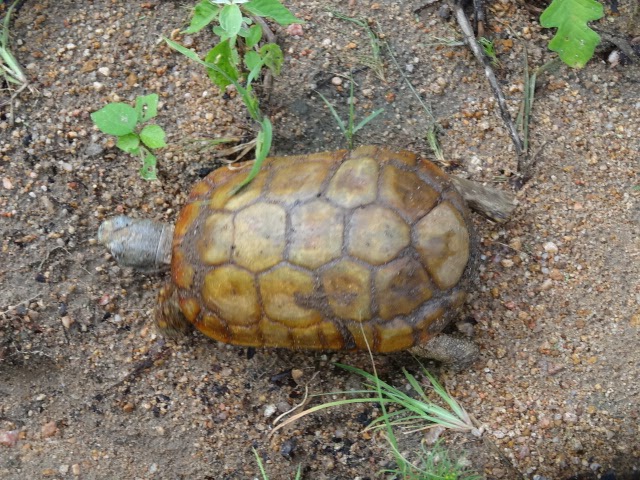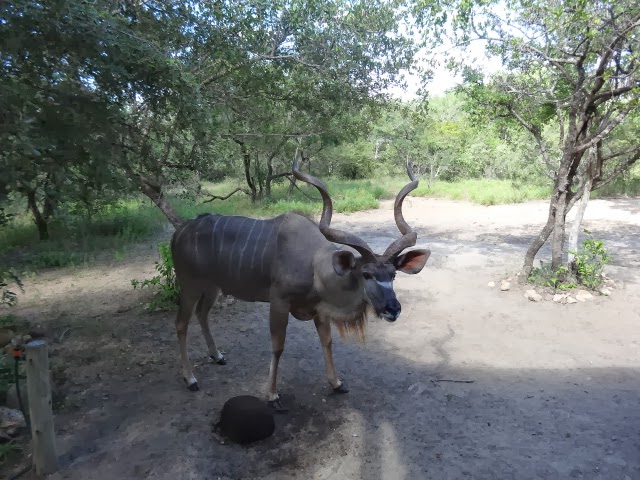 |
| It’s hard to believe that this is actually a flower on the Sickle Bush which we found in our garden a month ago. No longer do we see them “blooming” but we were grateful to have seen these two flowers.
Today, we’ll first share the “Small Things” in the vegetation category including some “Small Things” wildlife photos as you scroll down. Tomorrow, we’ll continue the most exciting of the all-new “Small Things,” wildlife photos. Please check back.
|
 |
| At first, I didn’t think these flowers on the Sickle Bush were real! |
Since our first “Small Things” post on December 13, 2013, we’ve continued to search for wildlife and vegetation of the minuscule variety. With much excitement, we share these with you today, some beautiful, others frightening, and some merely curious.
 |
| After searching through no less than 1000 photos I could not find the name of this flower. If you look closely it appears to have a face toward the upper center. If anyone is aware of the name of this flower, please write. |
There’s a miniature world that the human eye cannot see. If only we had access to the necessary equipment to explore that world freely. Perhaps, in time, technology will provide us with affordable digital equipment for the average user to see the smallest forms of life.
 |
| From research online, I believe this is a variety of the Aloe plant.
All of the photos we’ve posted here today were taken in our garden. Had I been brave enough to venture further into the dense bush without a trail, I’m certain I’d have found many more “Small Things” of interest. These were found in a short distance into the bush.
 Although I looked at hundreds of blue wildflowers growing in South Africa, here again, I wasn’t able to find the name of this wildflower.
As I take this walk often several times a day, my first consideration is to keep a watchful eye for snakes that may slither across the road. Once I feel assured that there are no snakes in the immediate area, I am able to stop to head into the tall grass to take photos.
 These lilac puffs are gone now as of a month ago when summer arrived. Now, that the heat of summer is here there are few flowers.
These past days, we had a considerable amount of much needed rain. This morning as we sit on the veranda, the sun peeked out shooting up the temperature in a dense layer of humidity.

The simplest wild daisy stands out in the bush.
The heat from the single mug of coffee I have each morning, makes me feel all the hotter. But, at the moment we’re inclined to stay outside. Our current visitors consist of a mom and three fast-growing baby warthogs, a flock of 12 Helmeted Guinea-Fowl, another mom and four baby warthogs, all regulars. They co-exist rather well, as we often giggle over their innocuous interactions.  This small aloe plant intrigued us with it’s “eye” in the center.
In the pouring rain on Sunday, the Helmeted Guinea-Fowl stopped by much to our surprise. Most of the wildlife stay undercover during severe weather. Their dripping wet blue faces and matted feathers elicited a sad moan from me. Ms. Turtle scooting across the edge of the driveway. We’ve spotted her in the same general area of the garden on several occasions.
We humans are fortunate that we have the brain size to have overcome a life of living in the bush like animals. How we’ve evolved! Sadly, in the process of our evolution we’ve managed to reduce the available habitat for wildlife to continue to thrive. I could easily get out my soapbox on that topic but for today, I’ll remain quiet.  Yikes! What in the world is this? We saw it while on the upstairs veranda on a nearby tree.
Watching it for several days without change, one day it was gone. Notice the tufts of hair growing
along some of the edges.
Today is an unusual day. At noon, Okee Dokee will pick me up for the almost half-hour drive to Komatipoort to purchase more data and a few odds and ends at the grocery store. This will be the longest time Tom and I have been apart since we left Minnesota almost fifteen months ago. Gee…what will he do while I’m away? |
























































































































































